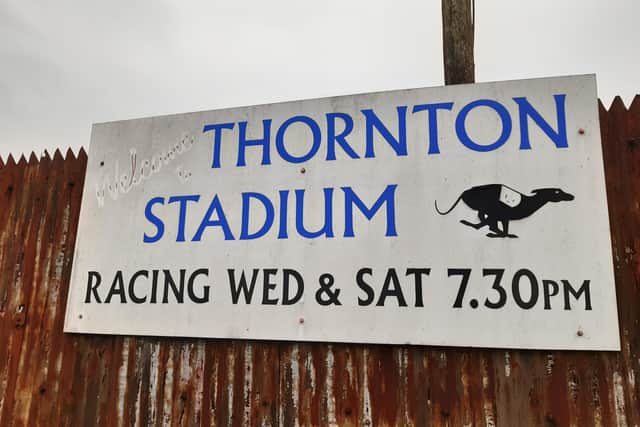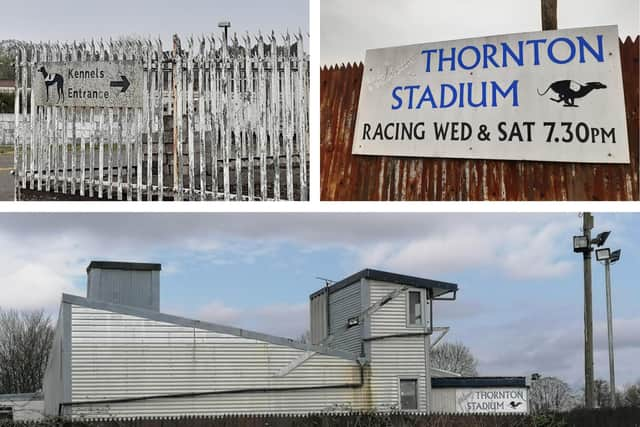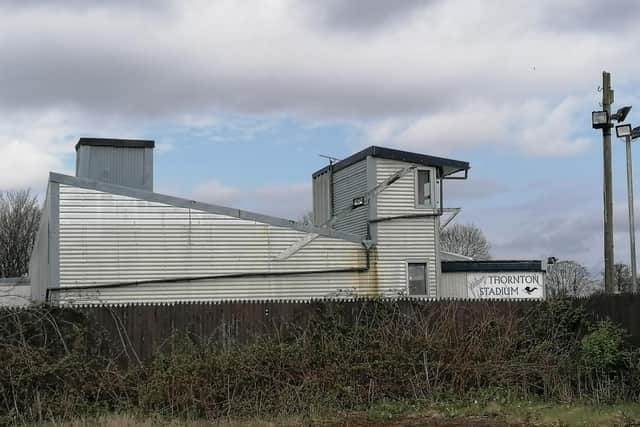Greyhound racing ban bid a 'travesty' says owner of Thornton race track
and live on Freeview channel 276
Thornton Greyhound Racing Stadium is all that remains of a sport that thrived post-war, and it is the only unlicensed track still operating in the UK.
Its future now hangs on the outcome of Petition PE1758 currently going through the committee stage at Holyrood. It aims to outlaw greyhound racing in Scotland which would make it the first country in the UK to do so.
Advertisement
Hide AdAdvertisement
Hide AdOn Wednesday, the Scottish Parliament’s rural affairs committee took evidence from the Greyhound Board of Great Britain - the snappily titled GBGB - which represents licensed tracks down south, and Paul Brignal, owner of the Thornton track which sits almost un-noticed close to the A92 dual carriageway. If the petition becomes law, it will mean the end of the road for the unlicensed track just short of its 90th anniversary.


The gates first opened on May 30, 1936. An advert in the Fife Free Press promoted races on Friday evenings and Saturday afternoons with admission just 1/- and the promise of a ”good bus services to the gate.”The sport was one of many to blossom in the 1900s and 50s, with its core audience of working men coming from the Kingdom’s many pits as well as dockyards. Their decline has mirrored greyhound racing’s diminishing presence. Scotland’s big tracks, Powderhall in Edinburgh, and Shawfield in Glasgow, have both closed along with all others, except the modest track on the outskirts of Thornton. It still operates races each weekend and midweek trials, but the numbers trackside at have dwindled.
Mr Bignal said: “It is part of Scotland’s heritage, but it’s more of a club these days. We excluded the public during COVID because of restrictions and we’ve not seen them come back in the same numbers. We need to do something to address that, but the stuff going on at the Scottish Parliament has just sucked the life out of us. We’re just carrying on until they make a decision.”
His weariness is obvious as he waits on the outcome of the committee hearings.
Advertisement
Hide AdAdvertisement
Hide AdMark Ruskell, the Green MSP for Mid-Scotland and Fife, has been a leading voice in the bid to bring greyhound racing to a phase closure in Scotland, stating: “ There is no place for dog racing in a modern and compassionate Scotland.”


Mr Ruskell said 1400 dog deaths was the ‘humane’ cost of the sport in the UK, but Mr Brignal said there were very few injuries at the Fife track which operates without a vet while licenced tracks have them on site.
He explained: “Every animal based sport would love to have a vet at every meeting - that would probably cost about £400 and we don’t have the capacity to pay that. In the rare event of serious injury there are several vet surgeries in close proximity - any greyhound would get treated faster than any kid going to A&E.”
Mr Bignal argues it is the responsibility of the owner to ensure their dog is fit and healthy. The same applies to whippet races, and dog agility competitions. He also uses his own eyes and a lifetime of experience to run the rule over the fitness of a dog.
Advertisement
Hide AdAdvertisement
Hide Ad“Our responsibility is to ensure the track is as safe as possible, and the environment is as good as possible, and we do that to the best of our ability.”


And while betting is a major part of the regulated tracks, at Thornton there is just one bookie who will take punters’ cash - having a small wager has been part and parcel of the sport since the traps first went up almost 90 years ago.
“A bookmaker is fundamental to the experience of dog racing,” he argued. “Some owners have a small bet - and it is a small bet to make it more exciting than running for a rosette - but many race for the pleasure of training their dog to compete to the best level that it can.”
Mark Ruskell takes a very different stance: “To hear those running Thornton say they are a better judge than a qualified vet over the injuries suffered by greyhounds is preposterous. To learn they won’t employ a vet because of cost, however, is despicable.
Advertisement
Hide AdAdvertisement
Hide Ad“We must choose paws over profit and use this evidence as further proof of why unlicensed and unregulated tracks should be phased out for good.”
That decision may be some way off yet as the committee gathers its evidence ahead of publishing its finding. Any Bill would have to go to Parliament.
For Mr Bignal, the debate has been skewed. He explained: “They asked for views, and the anti- greyhound people embraced it with enthusiasm. I don’t think the general public cares that much - the passionate animal rights activist has far more incentive to take part than anyone else”
He argues his track is as safe as it can be, and the doors are open to the SSPCA, animal welfare groups, and MSPs to come and see how it operates.
Advertisement
Hide AdAdvertisement
Hide Ad“All the people at our track look after their dogs exceptionally well,” he said. “We didn’t tell anyone the Scottish Animal Welfare Commission was coming - the first they knew was when I announced it over the tannoy. What they saw is what happens at our track. They saw greyhounds are in excellent condition.”
He now faces a waiting game as Holyrood deliberates. “It would be a travesty if it closed,” he said. “It is not a big industry - people who race dogs do it for fun.”